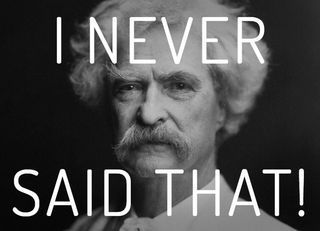Quotes and (sort of) mis-quotes
I am determined that I am never going to give up going to talk to student groups, whether they are about women, classics, the world etc... I am a university teacher and the job involves more than just spouting at the young; it involves engaging, discussing, talking at their societies and debates etc etc. But sometimes one's patience is sorely tried (and it's not the students's fault)
A week or so ago, I did a Q and A with a large group at St John's, organised by the college women's society, but a mixed audience. It had actually been a bit of a cock up on my part, because I had double-booked the previous Friday and got an email from the organisers of the John's event, arranging the rendezvous for later, just as I was getting on the train to give another lecture in London. (They forgave me and we refixed for the following Monday.)
Anyway, a few days later there was a report of the occasion in The Cambridge Student. (You know where this is going to end, dont you....!)
The report wasa friendly one and accurate as you could hope for in the circumstances (though the stuff about victims of social change got a bit garbled). It's just that when remarks made in a Q and A are taken out of context they change their meanings -- quite a lot.
I did say that sometimes, brearily, in the morning I woke up to the Today programme and found myself not "hearing" authority in the female politicians' voices. My point was to show that the correlation of (male) "depth" and "authority" was very culturally hard-wired (not natural). So that even I (who was pretty keen on women's power) could, when half awake, be a victim of the cultural stereotypes. I wasn't trying to say that I thought men were more authoritative than women.
And I probably did say that I had had a lot of support (perhaps more) from men than women at work; but the underlying point I was trying to make was that for some years I was the only female lecturer in my faculty. So of course I had had more support from men (even bearing in mind my excellent women's college).
So altogether it was an OK, though not perfect, piece.
Then yesterday afternoon I got an email from a journalist on the Mail, just as I was getting to the airport (for a conference in New York -- on which more later), asking me to confirm if the quotes were accurate. Full marks to her for checking. Very proper, and I'm very grateful, so I can't really complain. But all the same I am now bracing myself for how the story will come across there -- and for a wave of emails of the "how could you say that men speak with more authority than women" variety, which I never said and certainly didn't mean, and looking to the hours of email responses. (You can find the Mail piece as published here, under the heading "Why are females MPs so squeaky?" . . . err hang on..??)
Of course, few people are going to take much notice (though those that do will soon be at their email!) -- and in this case you cant actually point the finger at any particular journalistic crime; in fact everyone behaved remarkably properly. But you can see why you might decide against doing student Q and A's when not particularly accurate, if not frankly misleading, versions of what you said gets bandied about the popular prints.
OK I know it is an occupational hazards of D-list celebrity. What I have to remember is that doing Q and A's with students is important, fun (we had a great time... even though it turned out pricey for me, as I wanted to take the organisers out to dinner after royally messing up their arrangements!) and it's part of the job. Never mind what happens further down the food chain.
Mary Beard's Blog
- Mary Beard's profile
- 4110 followers




